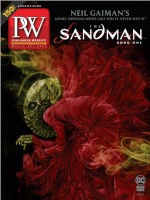In They Drown Our Daughters (Poisoned Pen, July), indie author Katrina Monroe’s traditional publishing debut, a seaside town’s mermaid legend has sinister implications for one local family. Monroe spoke with PW about identity, memory, and homecomings.
What inspired this book?
I’m interested in twisting around fairy tales, and I thought: What if [Hans Christian Andersen’s] little mermaid had a child who was adopted by a landfaring family? I didn’t think of it as a horror story—to me, horror meant the Saw movies. I wanted to boil things down to the idea of otherness, unease, feeling out of place where you are, and wanting to belong.
The characters are at broken moments in their lives: Meredith and her wife have separated, and Meredith’s mother, Judith, is struggling with the first symptoms of Alzheimer’s. How does this influence the story?
It started as a plot device. It’s helpful when one character doesn’t remember things—you’re forced to go find out the information. It puts a lot of pressure on Meredith to bend her perspective. Even at the beginning, when she’s frustrated that her mother’s dredging up these frightening tales, she knows that maybe it’s not her mother being awful; maybe she’s just falling into the gaps of memory.
What interests you about multigenerational stories?
There’s always something going on in a family dynamic that can’t be seen from the outside, and I like exploring those dynamics. When Meredith comes back to Cape Disappointment she’s not looking for forgiveness or to forgive; she just needs somewhere to go. She thinks her mother is paranoid and is trying to scare her about the water, but then her own daughter goes missing. Her identity as a mother and as a daughter are tested.
Meredith’s family are among the last in Cape Disappointment, a faded tourist town. How does the setting enhance the horror?
I grew up in Florida, where the beach means blue water and palm trees, and I was surprised the first time I went to a beach on the Pacific up near the Canadian border. It was gray and dull; there was nothing there. We went in the late fall, and it was desolate—dead crabs lined most of the beach. Being there felt like moving into a different world, and I thought, there can be no happy stories here. I think of those West Coast beaches as the end of the world; you look out and you see nothing, and here’s this tiny, crumbling lighthouse. How can you not set a horror story there?
There’s a long tradition of horror stories involving bodies of water. Do you find oceans inherently terrifying?
During my childhood in Florida, my mom taught me the stingray shuffle, where you constantly shuffle your feet so you don’t get stung. If you told me that now, I wouldn’t go in! But as a child you accept it. The unknown is scary, and it’s fun to be scared. As a child, Judith is drawn to the water as a child, but as an adult she sees it as this harbinger of doom. Don’t be out there, she says, unless you’re looking for trouble.



 Volume 269
Issue 13
03/28/2022
Volume 269
Issue 13
03/28/2022





